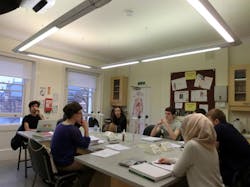what should I do if I fail my GCSEs or A levels?

Some of the data collected by this provider is for the purposes of personalization and measuring advertising effectiveness.
Some of the data collected by this provider is for the purposes of personalization and measuring advertising effectiveness.
Some of the data collected by this provider is for the purposes of personalization and measuring advertising effectiveness.


With A level and GCSE results days signal another year's exam results season is drawing to a close. Students in the sixth form receive their A level results whist GCSE grades follow in the month of August.
Many students will be celebrating and looking to their future plans with anticipation and excitement. For those that have not met their entry requirements it can be hard to know where to turn.
Depending on whether you have just completed your GCSEs or A levels, you have several different options. We will explore a few in brief below.
Don't be too hard on yourself. The English language used in exam questions can be a challenge for international students. Other students may struggle to manage their revision time effectively.
You may be feeling crestfallen, but there is always a way forward. The first thing that you should do is speak to your school. There should be someone available in the school office for you to speak with. They will be able to advise you on the options available to you at your current school or college. Also, speak to experts like Bright World. We have a wealth of knowledge of schools that still have spaces and are willing to be flexible, to accommodate students' goals and needs.

Most schools and colleges allow GCSE students to resit failed examinations. You can resit English and Maths exams in November and examinations in other subjects are then taken in the following June. You will need to double check the examination schedule with your school. Once you have identified what issues held you back in your previous exam, you can overcome these issues and achieve a pass grade.
One thing to bear in mind is that you can't simply retake one exam in which you performed badly. You will need to resit every exam that makes up a subject.

Another option is to apply for a one year GCSE programme and take examinations again after three terms. This usually involves a mixture of GCSE and IGCSE subjects with enrichment programmes in additional subjects. There are one year options available at more traditional boarding schools and also in city-based tutorial colleges who mainly exist to help students with intensive examination preparation.
The one year GCSE will allow you to gain grades in sufficient subjects to get you onto the next stage of your education. Fewer subjects are studied in a shorter time. Many of our partner schools have this one year option available and some even have flexible start dates in January and April.

Three year A level programmes combine a one year pre-A level course with onward progression into the A level curriculum. Providing, of course, that you perform well enough in the first year. They are particularly aimed at students who need to improve their English before their A level studies start in earnest.
It is also sometimes possible to start a three year A level course in January. As the first year is similar in structure to a pre-A level, you can join partway through the year.
Our network of schools include several that offer this option.

If you are aiming for a specific degree or university, A level retakes could be a good option.
If you choose to retake your A levels, it may be possible to do this at your current school or college. You will join a new class of A level students and sit your examinations with them in the following June.
There are also tutorial colleges who specialise in intensive retake programmes, with flexible start dates in January and April as well as the usual September intake.
Some students choose to study part time and resit their a levels online. There are a variety of online college courses which you can explore as a private candidate. You will sit your exams with all other candidates at the same time but are responsible for booking your own place. This also means that you may have time to gain some work experience alongside your studies.
In most cases, you will not be penalised for retaking your A levels. But you need to be careful when writing your personal statement. Focus on the positives. How has the experience helped you to develop as a person?
Resitting shows a commitment to achieving your goals and that you are motivated to work hard and improve yourself.

A one year foundation programme immerses you in a subject that you feel passionate about. You gain valuable subject knowledge and study skills. You also get the opportunity to improve your English.
Many colleges now offer a range of different subject pathways with a number of conditional offers from different universities upon completion.
A good example is the NCUK International Foundation Year programme, run by Mander Portman Woodward (MPW), one of Bright World's partners. This has been specifically designed to provide international students with the skills that they need to succeed at university.
Students can choose from several distinct pathways: Science, Engineering, Business & Humanities. Each pathway prepares students for a wide range of related subjects in each field. All pathways include English for Academic Purposes and three additional modules which are specific to your choice of pathway.
Clearing is where universities try to fill remaining places on their courses and is an ideal way for you to find a place in an alternative subject that interests you. You then communicate with universities directly, to see if they will offer you a place.
You can use clearing if:
You will need to register with UCAS to access clearing and view university and course information.

At Bright World, we can help to find you a course that enables you to reach your full potential. We can assist with placements into over 350 UK boarding schools and tutorial colleges. there are still a small number of GCSE and A level places available for the current academic year entry.
The Bright world placement service is free of charge and we will guide you from start to finish. Please enquire now for more information.
Since 2000 we have helped thousands of students to find a place in the UK education system.
Cory Holden, Admissions and Regional Manager, Bright World